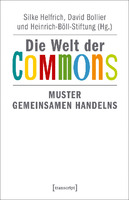Die Welt der Commons
Muster gemeinsamen Handelns
| dc.contributor.editor | Helfrich, Silke | |
| dc.contributor.editor | Bollier, David | |
| dc.date.accessioned | 2017-03-02 23:55 | |
| dc.date.accessioned | 2019-11-11 17:24:37 | |
| dc.date.accessioned | 2020-04-01T13:51:04Z | |
| dc.date.available | 2020-04-01T13:51:04Z | |
| dc.date.issued | 2015 | |
| dc.identifier | 624847 | |
| dc.identifier | OCN: 982239477 | en_US |
| dc.identifier.uri | http://library.oapen.org/handle/20.500.12657/31839 | |
| dc.description.abstract | The logic of capitalism is that of dividing and sharing. Only that in capitalism, people do not share, but rather, they themselves are divided up. For this reason, the British historian E.P. Thompson claims that »it was always a problem to explain the commons with capitalist categories«. Whoever enters into the world of the commons encounters another logic, another language and other categories. In this volume, authors from all continents investigate the anthropological foundations of the commons, and propose them at the same time as concrete utopias (E. Bloch). They make it possible to understand that everything is, or can become, commons: through processes of shared responsibility, in laboratories for self-organization and through freedom in solidarity. Commoners realize that which is already possible today, and will become obvious tomorrow. This is shown by over 40 examples from across the world. This book expands our notions of the possible when it comes to the organization of economics and society. With contributions by Nigel Gibson, Marianne Gronemeyer, Helmut Leitner, Etienne Le Roy, Andreas Weber, Rosa Luxemburg, Anne Salmond, David Sloan Wilson and more. | |
| dc.language | German | |
| dc.relation.ispartofseries | Sozialtheorie | |
| dc.subject.classification | thema EDItEUR::K Economics, Finance, Business and Management::KC Economics::KCA Economic theory and philosophy | en_US |
| dc.subject.other | governance | |
| dc.subject.other | commoning | |
| dc.subject.other | economy | |
| dc.subject.other | sociology | |
| dc.subject.other | open source | |
| dc.subject.other | emanzipation | |
| dc.subject.other | power | |
| dc.subject.other | freies wissen | |
| dc.subject.other | politik | |
| dc.subject.other | politics | |
| dc.subject.other | einhegung/enclosure | |
| dc.subject.other | cooperation | |
| dc.subject.other | wirtschaftstheorie | |
| dc.subject.other | macht | |
| dc.subject.other | vergemeinschaftung | |
| dc.subject.other | soziologie | |
| dc.subject.other | commoner | |
| dc.subject.other | kapitalismus | |
| dc.subject.other | öffentliche güter | |
| dc.subject.other | wirtschaftspolitik | |
| dc.subject.other | kooperation | |
| dc.subject.other | allmende | |
| dc.subject.other | nachhaltigkeit | |
| dc.subject.other | wirtschaft | |
| dc.subject.other | natur | |
| dc.subject.other | commons | |
| dc.subject.other | capitalism | |
| dc.subject.other | gemeingüter | |
| dc.subject.other | privatisierung | |
| dc.subject.other | economic policy | |
| dc.subject.other | public goods | |
| dc.subject.other | nature | |
| dc.subject.other | allemende | |
| dc.subject.other | zivilgesellschaft | |
| dc.subject.other | sustainability | |
| dc.subject.other | civil society | |
| dc.subject.other | gemeinwohl | |
| dc.subject.other | economic theory | |
| dc.title | Die Welt der Commons | |
| dc.title.alternative | Muster gemeinsamen Handelns | |
| dc.type | book | |
| oapen.abstract.otherlanguage | Die Logik des Kapitalismus heißt teilen. Nur teilen darin nicht die Menschen, sondern sie werden geteilt. Es ist daher problematisch, Commons in kapitalistischen Kategorien zu erklären. Wer die Welt der Commons betritt, begegnet einer anderen Logik, einer anderen Sprache und anderen Kategorien. Nach »Commons. Für eine neue Politik jenseits von Markt und Staat« (2012) erkunden in diesem Band Autorinnen und Autoren aller Kontinente die anthropologischen Grundlagen der Commons und stellen sie zugleich als konkrete Utopien vor. Sie machen nachvollziehbar, dass alles Commons sein oder werden kann: durch Prozesse geteilter Verantwortung, in Laboratorien für Selbstorganisation und durch Freiheit in Verbundenheit. Commoners realisieren, was schon heute machbar ist und morgen selbstverständlich sein wird. Das zeigen über 40 Beispiele aus aller Welt. Dieses Buch erweitert unseren Möglichkeitssinn für die Gestaltung von Wirtschaft und Gesellschaft. Mit Beiträgen u.a. von Nigel C. Gibson, Marianne Gronemeyer, Helmut Leitner, Étienne Le Roy, Andreas Weber, Rosa Luxemburg, Anne Salmond und David Sloan Wilson. | |
| oapen.identifier.doi | 10.14361/9783839432457 | |
| oapen.relation.isPublishedBy | b30a6210-768f-42e6-bb84-0e6306590b5c | |
| oapen.relation.isFundedBy | 07f61e34-5b96-49f0-9860-c87dd8228f26 | |
| oapen.relation.isbn | 9783837632453;9783732832453 | |
| oapen.collection | Swiss National Science Foundation (SNF) | |
| oapen.pages | 384 | |
| oapen.place.publication | Bielefeld | |
| oapen.identifier.ocn | 982239477 |

